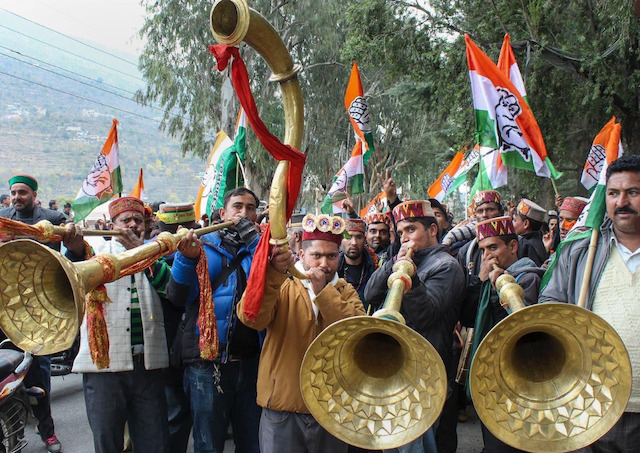I am sure most people can’t remember the last time the Congress won a state election, even a by-poll. In this context, the 8th of December, 2022, is a red letter day for the party, with its emphatic win in Himachal and in the two by-polls in Rajasthan and Chattisgarh. It won 40 of the 68 seats in Himachal, with a margin over the BJP safe enough to ensure that no rats jump the ship and that the lotus remains in Mr. Shah’s pleasant garden.
As expected, the BJP rebels queered the BJP’s pitch- of 21 only 2 won, the losing ones sealed the BJP candidates’ fates by taking away precious votes from the mother party. Mr. Dhumal doesn’t drink, but I have no doubt he is enjoying a satisfying cup of tea even as I write this. Mr. Nadda also doesn’t drink, but if ever someone needed a peg or two at this time, it is him. He has lost in his own state where he had complete say in the distribution of tickets, and has been found wanting. But I don’t want to do a post mortem of the results (that is best left to the pundits), just a little forensic audit of the post result scenario.
The Congress must realise that it didn’t win because of any towering personality, or any great work at the grass roots, or a better image., or Priyanka Gandh or the Bharat Jodo Yatra. It won because of dissatisfaction of the electorate on an enormous and diverse scale, and because the trade mark arrogance of the BJP had made it tone deaf to the people’s demands. These demands include: stoppage of work on destructive hydel projects, toning down the indiscriminate and unnecessary four lanning projects that have displaced large numbers of people, abandoning work on the controversial “international” airport in Balh valley (on which the ex-CM Jai Ram Thakur is willing to spend Rs. 5000 crores even as he says he has no money for the Old Pension Scheme), regulating the corporates who are slowly taking over the apple trade at the cost of the orchardists, streamlining the hospitality sector with a mix of incentives and regulations, creating more employment opportunities in the govt. sector. Going back to the Old Pension Scheme will be a major financial challenge, especially as the Centre is not likely to cooperate in the matter: funds will somehow have to be found for this, for the powerful lobby of govt. employees will be impatient for its implementation, having played perhaps the decisive role in the Congress victory. (I am not dwelling on other issues like Agniveer or price rise because these have origins in national policy making and are not susceptible to state level solutions).

These are vexed issues for a state which is already groaning under an over extended debt burden, and the Congress will soon discover that, notwithstanding its umbrella promises, there are no easy answers to them. It will have to prioritise and be selective in its choice of schemes and programmes, but in doing so it should keep its focus on the common man’s welfare, and not that of the contractor, bureaucrat, party coffers or cronies, as the BJP did. Nor should any project be made an ego or prestige issue ( like the Mandi airport or the Kinnaur and Lahaul-Spiti hydel projects): a politician’s prestige is a gift from the voter, and can be withdrawn by him too. Do what is good for the people in any given area, they know best- this, I think, is the central message of these elections, and the Congress would do well to heed it.
One of the critical failings of Jai Ram Thakur was his lack- lustre administration, of which he never appeared to be in command. It’s never a good idea for a Chief Minister to delegate everything to the bureaucracy; the civil service is like a thorough bred horse- it can perform supremely well, provided there is a firm hand on the reins. Someone like the iconic Virbhadra Singh understood this very well, which is why he was Chief Minister for six terms, and why the state has made the progress it has. He may have played favourites (which CM doesn’t?) but he never lost sight of competence and ability, and ensured his picks performed. In contrast, Jai Ram Thakur picked seven Chief Secretaries in five years, exposing his indecisiveness and poor choice making. He has paid the price, and the Congress must learn from this- choose the next CS wisely and don’t go by seniority alone ( the present incumbent is due to retire this month), give all your senior officers stable tenures, don’t launch a witch hunt for officers with a differing ideology- most bureaucrats are faithful only to their perks and subsequent pension and would not like to endanger either. Listen to your bureaucracy, but listen to the people too.
My biggest apprehension as I write this is the internecine warfare which is now likely to break out over the post of Chief Minister. This is the Congress’s achilles heel and can provide the BJP the opening it needs to initiate its guerrilla attacks on the Congress MLAs. In the past Madhya Pradesh, Rajasthan and Punjab have exposed this fatal flaw. The party has its problems in this area: the High Command is not strong enough to impose its will, like Mr. Modi or Shah can do; unlike in the bureaucracy political parties do not have a sacrosanct civil list to determine seniority; performance cannot be the only criteria- there are extraneous factors like the ability to raise funds or inter-party contacts or jerrymandering skills that are also important. There is no one formula or nostrum which can be acceptable to all. Therefore, in Himachal the Congress must choose the least divisive and most sustainable route- let its MLAs choose the Chief Minister by secret vote. This will not only show complete transparency but will also be the final test for the claims and counter claims of various individuals. Any one who emerges the victor after this process will command a legitimacy that will be difficult to dismiss or criticize.
The Congress has tasted victory after a long time, and should be suffused with the confidence that the BJP and Mr. Modi are not invincible. If one looks at the larger picture that has emerged on the 8th December, it shows that the BJP has been defeated in two of the three states that went for elections, and in five of the seven by-polls (the polling in Rampur is being contested in the Supreme Court). Himachal provides a timely launching pad for 2024, for building on the momentum provided by the Bharat Jodo Yatra. It can be the start of a new beginning in the state in the post Virbhadra Singh era, provided the number of dedicated workers exceeds the number of Chief Ministerial contenders. The gods of this Dev Bhoomi have blessed the party, now its karma will have to justify their munificence. There will be no second darshan.
| The author retired from the IAS in December 2010. A keen environmentalist and trekker he has published a book on high altitude trekking in the Himachal Himalayas: THE TRAILS LESS TRAVELLED.
His second book- SPECTRE OF CHOOR DHAR is a collection of short stories based in Himachal and was published in July 2019. His third book was released in August 2020: POLYTICKS, DEMOCKRAZY AND MUMBO JUMBO is a compilation of satirical and humorous articles on the state of our nation. His fourth book was published on 6th July 2021. Titled INDIA: THE WASTED YEARS , the book is a chronicle of missed opportunities in the last nine years. Shukla’s fifth book – THE DEPUTY COMMISSIONER’S DOG AND OTHER COLLEAGUES- was released on 12th September 2023. It portrays the lighter side of life in the IAS and in Himachal. He writes for various publications and websites on the environment, governance and social issues. He divides his time between Delhi and his cottage in a small village above Shimla. He blogs at http://avayshukla.blogspot.in/ |



